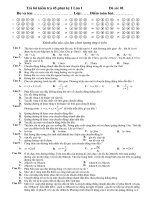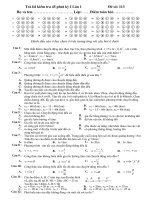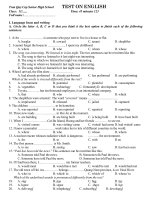KT 1 TIET E8 LAN 1
Bạn đang xem bản rút gọn của tài liệu. Xem và tải ngay bản đầy đủ của tài liệu tại đây (62.46 KB, 2 trang )
<span class='text_page_counter'>(1)</span><div class='page_container' data-page=1>
The Cao Thang Secondary School <b>ONE PERIOD TEST (1)</b>
Name: ……… Date: ……….
Class: 8 ….
MARK THE TEACHER’S IDEAS
<b>QUESTION 1; LISTENING (2,5 ms)</b>
<b>Listen to the passage, then decide if the statements are true (T) or false (F)</b>
1 ……….. Mrs Forbes was very young and very poor.
2 ……….. Some neighbors came in her room every day and cooked meals for her.
3 ……….. There was a bed and a table, and there were four chairs in her room.
4 ……….. She died at the age of eighty – four.
5 ……….. She left 17,000 dollars when she died.
<b> QUESTION 2; READING (2,5 ms)</b>
<b>Read the passage carefully and answer the questions</b>
You may use the telephone every day but how much do you know about it? The telephone was
invented by Alexander Bell in 1876. Bell was born in Scotland in 1847. But later he went to live in the USA.
Bell was always interested in sound. He wanted to be able to send sound through a wire. He had a
workshop in his house in American and did many experiences there.
One day, he was doing an experiment in his workshop. He was careless and spilt some burning
liquid onto his clothes. Talking into his telephone, Bell said, “Mr. Watson, I want you to come over here
immediately, please.” His assistant was in another room far away from the workshop. However, he heard
Bell clearly on his own telephone. Quickly, he ran to Bell’s workshop. “Mr. Bell, I heard every word you
said!” Watson shouted excitedly.
Bell succeeded. He invented the first telephone. Later, other inventors made better ones.
1. Who invented the first telephone?
...
2. Where was Alexander Bell born?
...
3. What did he want to do?
...
4. Did he do many experiences in the university?
...
5. Who did he talk to on his telephone?
...
<b>QUESTION 3; LANGUAGE FOCUS(2,5 ms)</b>
<b>Choose the best answer</b>
1. You should go to the . . . to buy some fish and vegetables.
</div>
<span class='text_page_counter'>(2)</span><div class='page_container' data-page=2>
2. A person who cannot speak or hear is call a . . . .
A. character B. deaf C. blind D. deaf-mute.
3. They . . . from Canada to America to find work.
A. started B. demonstrated C. delivered D. emigrated.
4. Can you come to the movies? No, I have to . . . my chores.
A. make B. think C. do D. keep
5. It is dangerous to let children . . . in the kitchen.
A. play B. to play C. playing D. to playing.
6. She was . . . of her son’s success in the competition.
A. honourable B. proud C. eager D. superior
7. Only a few of the children were brave enough . . . come closer.
A. for B. in order C. so D. to
8. I can never tell the difference . . . American and Canadian accents
A. from B. in C. between D. with
9. Would you like . . . her a message?
A. to leave B. leave C. leaving D. left
10. Our friends . . . meet us at the airport tonight.
A. are B. are going to C. go to D. will be to
<b>QUESTION 4; WRITING (2,5 ms)</b>
<i><b>Write a description of Hoa’s living room. Using the sets of words and phrases provided:</b></i>
This / Hoa’s living room.
...
There / a rug / in front of / fireplace.
...
A dog / lying / rug
...
On the fireplace / there / a mirror.
...
There / some pictures / wall / near mirror.
...
The television set / be / shelf / next to / lamp
...
The telephone / near / the lamp.
...
There be / another lamp / near / sofa.
...
The stereo / between / sofa / television.
...
There / a plant / behind / sofa / in front of / window.
</div>
<!--links-->









